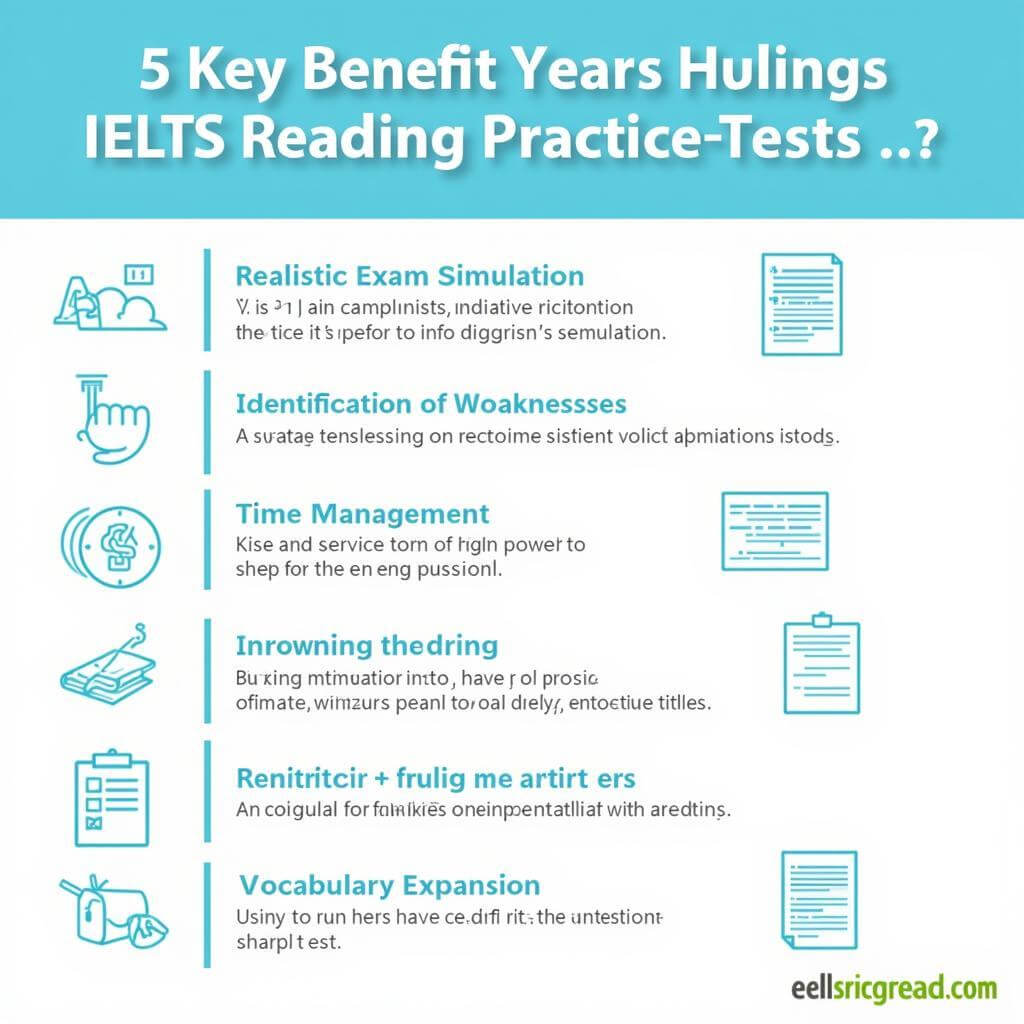IELTS Reading can be challenging, but with the right approach and consistent practice, you can significantly improve your accuracy. This guide explores effective techniques to enhance your IELTS Reading performance using practice tests, helping you achieve the score you desire.
Understanding the Importance of Practice Tests
Practice tests are invaluable tools for IELTS preparation, especially for the Reading section. They familiarize you with the exam format, question types, and time constraints, ultimately boosting your confidence and performance.
Benefits of Using Practice Tests
- Realistic exam simulation
- Identification of weaknesses
- Time management improvement
- Familiarity with question types
- Vocabulary expansion

Strategies to Enhance Reading Accuracy
To maximize the effectiveness of your practice tests and improve your IELTS Reading accuracy, consider implementing these strategies:
1. Skim and Scan Effectively
Skimming and scanning are crucial skills for IELTS Reading. Practice these techniques to quickly locate specific information and understand the main ideas of passages.
“Skimming and scanning are like using a magnifying glass on text. They allow you to zoom in on key information rapidly,” says Dr. Emma Thompson, IELTS expert with 15 years of experience.
2. Develop Time Management Skills
Allocate specific time limits for each passage and stick to them during practice. This helps you pace yourself effectively during the actual exam.
3. Analyze Question Types
Familiarize yourself with various question types in IELTS Reading. Pay special attention to strategies to approach IELTS true/false questions and handling multiple-choice efficiently.
4. Focus on Keywords
Identify keywords in questions and passages to quickly locate relevant information. This skill is essential for improving speed for answering questions.
5. Practice Active Reading
Engage with the text by asking questions, making mental notes, and predicting content. This approach enhances comprehension and retention.
Maximizing Practice Test Effectiveness
To get the most out of your practice tests, follow these steps:
- Create a realistic test environment
- Time yourself strictly
- Review answers thoroughly
- Analyze mistakes and patterns
- Track progress over time
Advanced Techniques for Accuracy Improvement
Once you’ve mastered the basics, incorporate these advanced techniques to further enhance your IELTS Reading accuracy:
1. Develop Inference Skills
Practice reading between the lines and drawing conclusions based on implied information. This skill is crucial for higher-level questions.
2. Expand Your Vocabulary
Build your vocabulary systematically, focusing on academic and topic-specific words commonly found in IELTS Reading passages.
3. Improve Grammar Recognition
Enhance your ability to recognize complex grammatical structures. This can help you in using grammar for accurate descriptions and understanding nuanced meanings.
4. Practice Paraphrasing
Develop the skill of rephrasing information in your own words. This helps in matching paraphrased answers to the original text.
“Paraphrasing is the secret weapon of successful IELTS candidates. It bridges the gap between what you read and what you understand,” advises Professor James Chen, IELTS researcher and trainer.
Overcoming Common Challenges
Many test-takers face similar obstacles when improving their IELTS Reading accuracy. Here are some strategies to overcome these challenges:
- Time pressure: Practice with shorter time limits to build speed and accuracy simultaneously.
- Unfamiliar topics: Read widely on various subjects to broaden your knowledge base.
- Complex vocabulary: Create a personal dictionary of challenging words encountered in practice tests.
- Concentration issues: Implement focused reading sessions, gradually increasing duration.
Fine-tuning Your Approach
As you progress in your IELTS Reading preparation, consider these tips to fine-tune your approach:
- Regularly reassess your strategies and adjust as needed
- Seek feedback from experienced tutors or study groups
- Experiment with different types of practice materials
- Focus on strategies for approaching reading with confidence
Conclusion
Improving IELTS Reading accuracy with practice tests is a journey that requires dedication, strategy, and consistent effort. By implementing the techniques discussed in this guide and regularly practicing with high-quality materials, you can significantly enhance your performance. Remember, each practice test is an opportunity to learn and grow. Stay focused, track your progress, and approach your IELTS Reading preparation with confidence. With perseverance and the right strategies, you’ll be well on your way to achieving your desired IELTS score.
FAQ
-
How many practice tests should I complete before the actual IELTS exam?
It’s recommended to complete at least 10-15 full-length practice tests before your exam date. However, quality is more important than quantity, so focus on thorough review and learning from each test. -
Can I improve my IELTS Reading score in a short time using practice tests?
While significant improvement typically requires consistent practice over several weeks or months, focused study with practice tests can lead to noticeable improvements in a shorter period, especially in areas like time management and familiarity with question types. -
Are online practice tests as effective as paper-based ones?
Both online and paper-based tests can be effective. Online tests often provide immediate feedback and scoring, while paper-based tests more closely simulate the actual exam experience. It’s beneficial to use a combination of both. -
How can I stay motivated during long reading practice sessions?
Set specific, achievable goals for each practice session, vary the topics and difficulty levels of your practice materials, and reward yourself for meeting your study targets. -
Should I focus on my weakest areas or practice all question types equally?
While it’s important to improve your weak areas, balanced practice across all question types is crucial. Allocate more time to challenging areas but ensure you maintain proficiency in stronger areas as well.